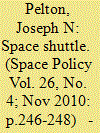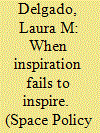| Srl | Item |
| 1 |
ID:
100223


|
|
|
|
|
| Publication |
2010.
|
| Summary/Abstract |
The Space Transportation System (STS), for better or worse, has dominated the US space program for some 30 years and is now an American icon. The Space Shuttle orbiters have flown over 120 missions and certainly accomplished some amazing feats, including the deployment of the International Space Station (ISS), the launch and double repair of the Hubble Telescope, a number of classified missions for the US defense establishment and the cementing of international cooperation in space. As the remaining Space Shuttle orbiters head toward various museums, it is timely to look at the STS program in terms of key US space policy decisions that have paralleled the Space Shuttle's often troubled history. This article seeks, from both a historical and a policy perspective, to assess what might have been. While noting the major accomplishments of the STS, it also identifies what can best be characterized as major lost opportunities and flawed policy decisions that have had multi-billion dollar consequences. In this regard, the US Congress, the White House, and NASA leadership have all played a role. If there have been failings, they have not been by NASA alone, but the entire US space policy leadership.
|
|
|
|
|
|
|
|
|
|
|
|
|
|
|
|
| 2 |
ID:
157187


|
|
|
|
|
| Summary/Abstract |
A pressing issue facing the US space program is the projected shortfall in the skilled aerospace workforce, as the number of students in space-related fields wanes. This has prompted many to emphasize the rhetoric of inspiration that prevailed during the Cold War, at the expense of concrete arguments for space that are thought to be lackluster and insufficient. This essay argues that the logic of inspiration fails to consider the changed context and attitudes of this younger public. Instead, such an approach proves counterproductive in attracting generations compelled by a host of ideas, some incompatible with the rhetoric of competition and prestige that prevailed before. Arguments that draw attention to the pragmatic elements of space, and that successfully align space with the notions that make sense now, may in turn prove to be the solution to draw the best and the brightest to the space program.
|
|
|
|
|
|
|
|
|
|
|
|
|
|
|
|